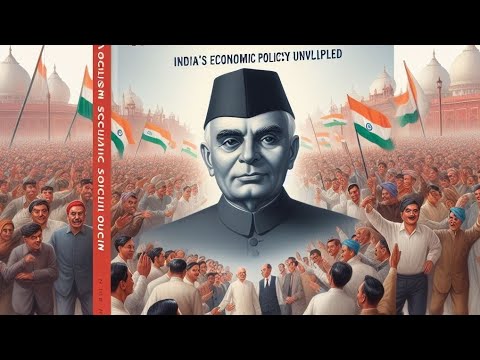In this video, we dive deep into Nehruvian Socialism, the economic policy that shaped independent India. Join us as we explore the intricacies, pros, and cons of this influential ideology. From its impact on the economy to its legacy in contemporary India, we cover it all. Don’t miss out on this insightful discussion! If you find this video informative, remember to like and share it with your friends. Let’s spread knowledge together!
OUTLINE:
00:00:00 Introduction to Nehruvian Socialism
00:01:10 Understanding Nehruvian Socialism
00:03:51 Pros of Nehruvian Socialism
00:06:28 Cons of Nehruvian Socialism
00:08:51 Summary and Conclusion
In the aftermath of India’s independence in 1947, Jawaharlal Nehru, the country’s first Prime Minister, embarked on a bold economic experiment known as Nehruvian socialism. Rooted in socialist principles, this policy aimed to create a mixed economy that combined elements of state control and private enterprise to achieve rapid industrialization and social welfare.
Nehruvian socialism was influenced by Nehru’s vision of a modern, progressive India that prioritized social justice, economic equality, and national self-reliance. To realize this vision, Nehru and his advisors implemented a series of policies aimed at industrializing the country and reducing poverty through state-led planning and intervention.
Key features of Nehruvian socialism included the establishment of large-scale public sector enterprises in strategic industries such as steel, coal, and heavy machinery. These state-owned enterprises played a central role in driving industrial growth and infrastructure development, laying the foundation for India’s industrial base.
Additionally, Nehruvian socialism emphasized the importance of land reforms and agricultural modernization to improve rural livelihoods and reduce inequality. Land redistribution initiatives aimed to abolish feudal landholding patterns and empower small-scale farmers, while investments in irrigation, mechanization, and rural infrastructure aimed to boost agricultural productivity.
However, Nehruvian socialism also faced criticism for its heavy reliance on bureaucratic planning and state control, which stifled entrepreneurship and innovation. The License Raj, a system of permits and regulations imposed by the government, hindered private investment and stifled competition, leading to inefficiency and corruption.
Moreover, the emphasis on heavy industry and neglect of small-scale enterprises and agriculture led to imbalances in the economy and disparities in development between urban and rural areas. While Nehruvian socialism succeeded in laying the groundwork for industrialization, it failed to address the needs of India’s vast rural population adequately.
In the decades following Nehru’s tenure, India gradually shifted away from Nehruvian socialism towards economic liberalization and market-oriented reforms. The dismantling of the License Raj and the opening up of the economy to foreign investment unleashed a wave of economic growth and globalization, transforming India into one of the world’s fastest-growing major economies.
Nevertheless, the legacy of Nehruvian socialism continues to influence India’s economic policies and political discourse to this day. While some view it as a period of idealism and nation-building, others criticize its shortcomings and the enduring challenges it left behind.
As India navigates the complexities of economic development and social welfare in the 21st century, it is essential to reflect on the lessons of Nehruvian socialism and chart a path forward that balances state intervention with market dynamism, ensuring inclusive and sustainable growth for all.
#NehruvianSocialism #EconomicPolicy #IndianEconomy #SocialJustice #Industrialization #MixedEconomy #LandReforms #LicenseRaj #MarketReforms #Development #Inequality #SelfReliance #NationBuilding
source


